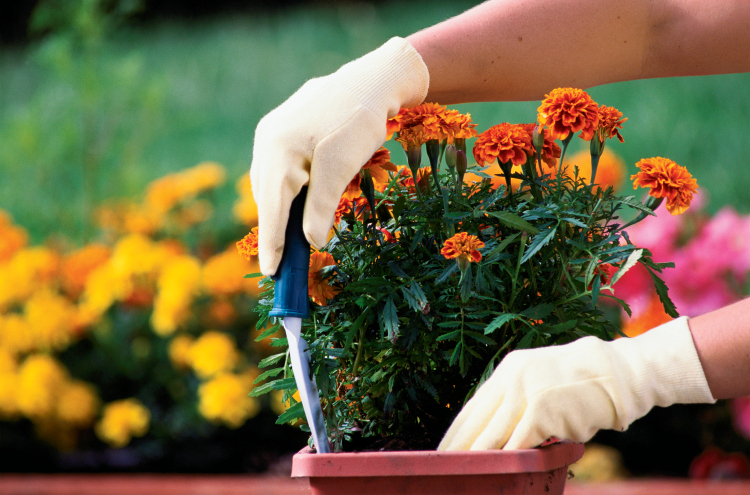How Gardening Helps Your Health
I’ve been gardening for more than 25 years, and experience has taught me that gardening benefits my body as well as my mind. Working in my garden is a real stress buster, helping me relieve feelings of anxiety and providing a break from the general rush of my life.

1. Gardening is a natural mental health plan.
I’ve learned that I’m not alone in my thinking. Noted author Eva Shaw reports many psychological benefits of gardening in her book Shovel It: Nature’s Health Plan. Her research found that people who garden generate the same brainwaves as people who meditate, and that grief-stricken people who worked in a garden recovered faster than those who didn’t. She also reports that gardening can lower blood pressure, reduce depression, cut the effects of chronic fatigue and reduce the need for pain medication.
Environmental psychologist Roger Ulrich reports similar findings in his research. His studies show that even just viewing a garden or nature has healthy psychological benefits and can help people heal and recover faster. Many hospitals now have gardens as part of their facilities because Ulrich’s research has shown that people with wounds or other physical problems heal faster if exposed to gardens or landscapes. By focusing less on themselves and more on plants, they have a more positive outlook.
Ulrich now works full-time consulting on the design and implementation of “therapeutic gardens” for health-care facilities. His work demonstrates that gardens can be planted with stress reduction in mind – using soothing colors and scents – and buildings need to be designed to provide plenty of views of nature.
Gardening connects us with the rhythm of life.
In fact, a growing area of professional study is horticulture therapy, which uses plants and gardens as a mode of treatment for recovery from a variety of maladies.
2. Gardening nurtures creativity.
Gardening can also be a good brain workout. It gives us a chance to be creative.
I like to think of plants as my box of crayons or paints, and the “canvas” I create usually provides a great deal of satisfaction for me along with a sense of accomplishment.
Plants serve as mental refreshment. Research by Dr. Virginia Lohr found that when interior plants or flower arrangements are placed in an interior work environment, employee work productivity is increased and absenteeism is decreased. Based on this finding, my boss provides fresh flowers weekly for all office staff.
3. Kids avoid nature-deficit disorder.
Adults aren’t the only ones to reap the benefits of gardening; it’s advantageous for children, as well.
In his latest book, Last Child in the Woods: Saving Our Children From Nature-Deficit Disorder, journalist Richard Louv says that many children today who spend too much time “indoors” being physically inactive and not engaged in the natural world suffer from nature-deficit disorder. He reports that the symptoms of nature-deficit disorder are ADHD, depression and obesity.
We are seeing an all-time high of these afflictions in our children. Louv maintains that gardening is a good activity to engage our children with the natural world and reduce nature-deficit disorder. I can’t tell you how many times I make my children shut off the television and computer and go play outside in their own garden.
Gardening requires us to live in garden time. We all could use a lesson in slowing down, and the garden therapy you can find in your own backyard might be cheaper than a therapist.
Even if you don’t have a green thumb, you can benefit from a bit of garden therapy.













 My Indiana Home is produced for Indiana Farm Bureau members. Our mission is to connect you with the food you eat, the Indiana farmers who grow it and a rural lifestyle that is uniquely Hoosier.
My Indiana Home is produced for Indiana Farm Bureau members. Our mission is to connect you with the food you eat, the Indiana farmers who grow it and a rural lifestyle that is uniquely Hoosier.
Leave a Comment